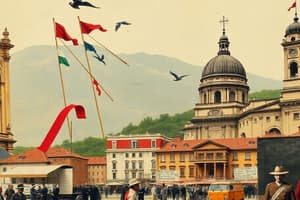Podcast
Questions and Answers
What was the main factor contributing to the emergence of Balkan Nationalism in the 19th century?
What was the main factor contributing to the emergence of Balkan Nationalism in the 19th century?
- Growing sense of national identity and self-determination
- Economic and social changes
- Influence of European nationalist movements
- All of the above (correct)
The Ottoman Empire was at the height of its power in the 19th century.
The Ottoman Empire was at the height of its power in the 19th century.
False (B)
Who led the process of Italian Unification?
Who led the process of Italian Unification?
Victor Emmanuel II, Camillo Benso di Cavour, and Giuseppe Garibaldi
The _______________ War marked the final stage of Italian Unification.
The _______________ War marked the final stage of Italian Unification.
Match the following nationalist movements with their respective countries:
Match the following nationalist movements with their respective countries:
What was the main driver of Imperialism in the 19th century?
What was the main driver of Imperialism in the 19th century?
The Unification of Germany was led by Austria.
The Unification of Germany was led by Austria.
What was the outcome of the Balkan Wars (1912-1913)?
What was the outcome of the Balkan Wars (1912-1913)?
Study Notes
Balkan Nationalism
- Emerged in the 19th century as a response to Ottoman rule and Habsburg dominance
- Key factors:
- Growing sense of national identity and self-determination
- Economic and social changes (e.g., industrialization, urbanization)
- Influence of European nationalist movements (e.g., Italian and German unification)
- Notable events:
- Serbian Revolution (1804-1835)
- Greek War of Independence (1821-1832)
- Balkan Wars (1912-1913)
Italian Unification
- Process of unification led by Victor Emmanuel II, Camillo Benso di Cavour, and Giuseppe Garibaldi
- Key events:
- Revolutions of 1848
- Formation of the Kingdom of Sardinia (1848)
- Franco-Prussian War (1870-1871)
- Proclamation of the Kingdom of Italy (1861)
- Factors contributing to unification:
- Economic and cultural ties between Italian states
- Nationalist sentiment and desire for independence
- Diplomatic and military support from European powers (e.g., France)
Unification of Germany
- Process of unification led by Otto von Bismarck and Prussia
- Key events:
- Revolutions of 1848
- Formation of the North German Confederation (1867)
- Franco-Prussian War (1870-1871)
- Proclamation of the German Empire (1871)
- Factors contributing to unification:
- Economic and cultural ties between German states
- Nationalist sentiment and desire for independence
- Diplomatic and military support from European powers (e.g., Russia)
Ottoman Decline
- Decline of the Ottoman Empire in the 19th century
- Key factors:
- Internal decay and corruption
- External pressures (e.g., European imperialism, nationalism)
- Weakness in military and economy
- Notable events:
- Tanzimat reforms (1839-1876)
- Balkan Wars (1912-1913)
- World War I (1914-1918)
Imperialism vs Nationalism
- Imperialism: expansion and domination of one country over another
- Nationalism: emphasis on national identity, self-determination, and independence
- Key conflicts:
- Imperialist powers (e.g., Britain, France) vs nationalist movements (e.g., Italian, German)
- Clash between imperialist and nationalist ideologies
- Impact on global politics and international relations
Balkan Nationalism
- Emerged in 19th century as a response to Ottoman rule and Habsburg dominance
- Characterized by growing sense of national identity and self-determination, economic and social changes, and influence of European nationalist movements
- Serbian Revolution (1804-1835) and Greek War of Independence (1821-1832) were key events in this period
- Balkan Wars (1912-1913) marked a significant turning point in the region's history
Italian Unification
- Led by Victor Emmanuel II, Camillo Benso di Cavour, and Giuseppe Garibaldi
- Revolutions of 1848 sparked the unification process, which was furthered by the formation of the Kingdom of Sardinia (1848)
- Franco-Prussian War (1870-1871) and the Proclamation of the Kingdom of Italy (1861) were key events
- Economic and cultural ties between Italian states, nationalist sentiment, and diplomatic support from European powers contributed to unification
Unification of Germany
- Led by Otto von Bismarck and Prussia
- Revolutions of 1848 and the formation of the North German Confederation (1867) were key events
- Franco-Prussian War (1870-1871) led to the Proclamation of the German Empire (1871)
- Economic and cultural ties between German states, nationalist sentiment, and diplomatic support from European powers contributed to unification
Ottoman Decline
- Characterized by internal decay and corruption, external pressures, and weakness in military and economy
- Tanzimat reforms (1839-1876) aimed to modernize the empire, but ultimately failed to stem the decline
- Balkan Wars (1912-1913) and World War I (1914-1918) marked the downfall of the Ottoman Empire
Imperialism vs Nationalism
- Imperialism: expansion and domination of one country over another, often driven by economic and strategic interests
- Nationalism: emphasis on national identity, self-determination, and independence, often driven by emotional and cultural appeals
- The two ideologies clashed in the 19th century, with imperialist powers like Britain and France facing opposition from nationalist movements like the Italian and German unification movements
- This conflict shaped global politics and international relations
Studying That Suits You
Use AI to generate personalized quizzes and flashcards to suit your learning preferences.
Description
This quiz covers the emergence of Balkan nationalism in the 19th century as a response to Ottoman rule and Habsburg dominance, and the process of Italian unification. It explores key factors, notable events, and nationalist movements.




